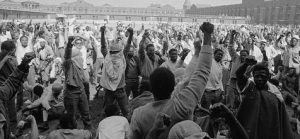
Attica Prison uprising, 1971
AUGUST 28—Prisoners across the US are on strike against the racist and inhuman conditions they face in the largest penal system in the world. Millions of men, women and children in the US are locked up—overwhelmingly black, latinos/as and/or poor. At any given time, at least 80,000 people are subjected to the torture of solitary confinement. The s park that precipitated the strike was a prison riot on April 15 which, according to one prisoners’ group, was caused by “the greed wrought by mass incarceration, and a lack of respect for human life that is embedded in our nation’s penal ideology.” It has spread nationwide, beginning on Aug. 21, the anniversary of a 1971 prison rebellion in San Quentin, California, and will end on Sept. 9, the anniversary of the 1971 Attica uprising in upstate New York. Although prison authorities are trying to suppress the news of the strike, there are reports of prisoners in Florida refusing to work and detainees at the ICE prison in Tacoma, Washington, refusing to eat. Five Florida prisons are now on lockdown, and there is additional strike activity in North Carolina, South Carolina, Georgia and California.
In US jails and prisons, inmates are sharply and overtly divided by race, ethnicity and presumed or real gang affiliation. Strike organizers have gone out of their way to build unity across all these divisions.
The prison system is the most racist and inhuman manifestation of the lack of respect that capitalism holds for all working people.
Prisons reflect capitalism’s need to violently impose the rule of the tiny capitalist class on the vast majority—the working class. While the capitalists— the real criminals—walk free, jails and prisons lock up nonviolent drug addicts, homeless people, those who suffer from mental illness, immigrants detained for crossing the bosses’ borders, and those who the system has failed.
The 700% increase in the prison population since the 1970s reflects the decline of the US as an imperialist power. The 1960s and 70s saw the mass rebellion of black soldiers and workers in Vietnam and US cities, rising up against the systematic racism of every social institution, including the police. The late 70s saw the closing down of steel, auto, and tire factories where black men had begun to get steady jobs. This combination of increased militancy and mass unemployment terrified the ruling class as it showed the revolutionary potential of black workers.
What followed in the 1980s was an influx of crack cocaine, a surge in aggressive policing, and the doubling of the prison population within a decade. The chaos the US rulers had created in Central America and Mexico forced millions of workers to come to the US for work. This allowed the rulers to incarcerate hundreds of thousands of black workers, while consigning immigrant workers to the lowest-paid jobs in agriculture, garment factories and service industries Currently, latinas/os prisoners are the fastest growing sector of the incarcerated population.
Communist society will solve social problems collectively and humanely.
Prison strike organizers condemn the racist and inhuman nature of the prison system and calls for reforms. They demand that prison labor, which includes prison jobs, firefighting, and contracting for big business, be paid at a minimum wage, instead of the pennies per hour it pays now.
We call for revolution, not reform, for a communist society where we ’ll do away with exploitation and money, and work collectively to solve.
Other organizations are calling for prison abolition. According to the Nation Magazine, they “call for a vision of a society where housing, education, and health care are met, allowing people to live safe and fulfilled lives without the need for prisons.” They propose a moratorium on prison construction, restorative justice, and an end to policing.
Prison abolition attracts many people who share our ideals of a just society, but who fail to understand that this will require a revolution. Capitalism is based on profit, squeezed from the labor of our class. It requires the racist and sexist division of the working class, It requires a police force to keep power and control in the hands of the few while condemning millions of our class around the world to poverty, homelessness, inadequate health care and extreme alienation.
On the other hand, capitalism also brings us together on the job, in our schools, and in our communities, in prisons and barracks, where we can organize to overthrow them. We must take advantage of this potential, and mobilize the masses in prison and out for revolution and to build a communist society.

